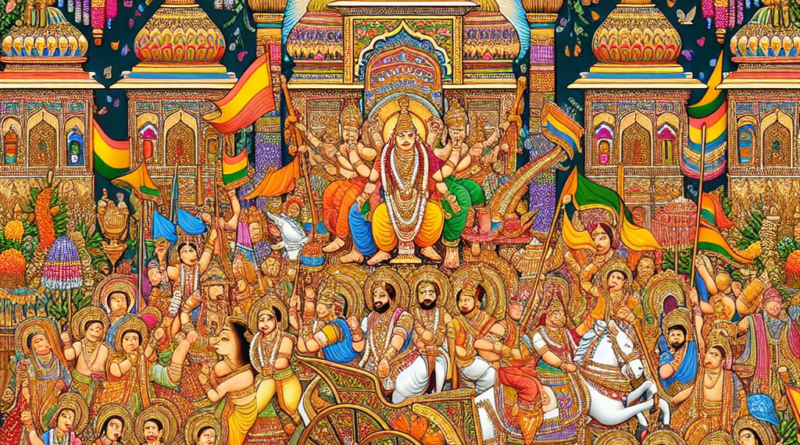Vibrant celebrations of Hindu culture and faith
Title: Celebrating Diversity and Unity: The Cultural Significance of Hindu Festivals in India
Hindu festivals play a crucial role in the vibrant tapestry of Indian culture, showcasing the rich heritage and traditions that have been passed down through generations. These festivals are not just mere celebrations; they hold deep cultural, historical, and spiritual significance that bring people together in unity and harmony. Let’s delve into the historical context and contemporary relevance of some of the most prominent Hindu festivals in India.
1. Diwali: The Festival of Lights
Diwali, also known as Deepavali, is one of the most significant Hindu festivals celebrated with great fervor across India. It symbolizes the victory of light over darkness and good over evil. Historical accounts trace the origins of Diwali to ancient times when Lord Rama returned to Ayodhya after defeating the demon king Ravana. The people of Ayodhya lit oil lamps to welcome him back, thus marking the beginning of the tradition of lighting lamps during Diwali.
In contemporary times, Diwali is celebrated by lighting diyas (oil lamps), decorating homes with colorful rangoli patterns, bursting firecrackers, and exchanging sweets and gifts. Beyond the festivities, Diwali signifies the triumph of knowledge over ignorance and the importance of inner enlightenment.
2. Holi: The Festival of Colors
Holi, known as the festival of colors, is a joyous celebration that heralds the arrival of spring. Its roots can be traced back to Hindu mythology, specifically the legend of Holika and Prahlad. The festival commemorates the victory of devotion and righteousness over evil forces. People come together to play with vibrant colors, dance to lively music, and enjoy festive delicacies.
In contemporary times, Holi has transcended religious boundaries and is celebrated by people of all faiths across India and the world. It promotes social harmony, unity, and the spirit of brotherhood among diverse communities.
3. Navaratri and Durga Puja: Worshiping the Divine Feminine
Navaratri, a nine-night festival dedicated to the worship of Goddess Durga, is celebrated with great pomp and fervor in various parts of India. The festival signifies the triumph of good over evil and the power of the divine feminine. During Navaratri, people observe fasts, perform traditional dances like Garba and Dandiya, and offer prayers to Goddess Durga.
Durga Puja, a major festival in West Bengal, honors Goddess Durga’s victory over the demon Mahishasura. Elaborate pandals (temporary structures) are constructed to house beautifully crafted idols of the goddess, and cultural programs are organized to showcase traditional music and dance forms.
4. Ganesh Chaturthi: Honoring the Elephant-Headed God
Ganesh Chaturthi is a ten-day festival dedicated to Lord Ganesha, the remover of obstacles and the god of wisdom and prosperity. The festival begins with the installation of clay idols of Lord Ganesha in homes and public pandals. Devotees offer prayers, perform rituals, and immerse the idols in water bodies on the final day.
Ganesh Chaturthi holds immense cultural significance as it fosters a sense of community bonding and environmental consciousness. The festival emphasizes the importance of eco-friendly celebrations and sustainable practices.
5. Raksha Bandhan: Celebrating Sibling Bond
Raksha Bandhan, also known as Rakhi, is a traditional Hindu festival that celebrates the bond between brothers and sisters. Sisters tie a sacred thread (rakhi) on their brothers’ wrists as a symbol of love and protection. In return, brothers pledge to protect their sisters and shower them with gifts.
Beyond its ritualistic significance, Raksha Bandhan highlights the importance of familial bonds, love, and mutual respect. It reinforces the values of unity, harmony, and respect for one another.
In conclusion, Hindu festivals in India are not just religious observances; they are cultural landmarks that bind people together in a tapestry of traditions, values, and shared experiences. These festivals serve as a reminder of the country’s rich heritage, diverse cultural practices, and timeless spiritual wisdom. As India continues to evolve in the modern era, the essence of these festivals remains a testament to the enduring legacy and cultural vibrancy of Hindu traditions.

